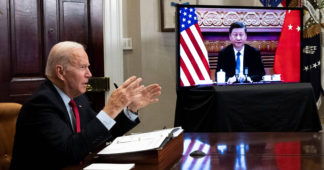Jake Sullivan said there will be more engagement with China to avoid conflict
Posted on ategories
On Tuesday, National Security Advisor Jake Sullivan said President Biden and Chinese President Xi Jinping agreed to begin discussions on arms control during virtual talks on Monday night that lasted over three hours.
“The two leaders agreed that we would look to begin to carry forward discussions on strategic stability,” Sullivan said at a Brooking Institute event when asked about China’s nuclear arsenal.
Sullivan signaled that while the two leaders agreed to begin a dialogue, the plans are still tentative. “It is now incumbent on us to think about the most productive way to carry it forward from here,” he said.
With China as the Pentagon’s main focus, there has been a lot of hype over its nuclear arsenal, which is estimated to be around 300 warheads, vastly smaller than the US’s arsenal of 5,750 warheads. In a recent report, the Pentagon claimed China could potentially bring its arsenal up to 1,000 warheads by 2030.
Until now, the US has called on China to engage in trilateral arms control talks with Russia. But Moscow has over 6,000 warheads, giving Beijing little motive to sign arms control treaties with the two major nuclear powers. Engaging directly with China could result in agreements about the deployment of nuclear weapons or other types of missiles in the Asia Pacific region if the US is serious about the dialogue.
Averting conflict appeared to be the main focus of the Xi-Biden talks, and Sullivan said there will be more engagement to this end. “You will see at multiple levels an intensification of the engagement to ensure that there are guardrails around this competition so that it doesn’t veer off into conflict,” he said.
Published at news.antiwar.com
We remind our readers that publication of articles on our site does not mean that we agree with what is written. Our policy is to publish anything which we consider of interest, so as to assist our readers in forming their opinions. Sometimes we even publish articles with which we totally disagree, since we believe it is important for our readers to be informed on as wide a spectrum of views as possible.











